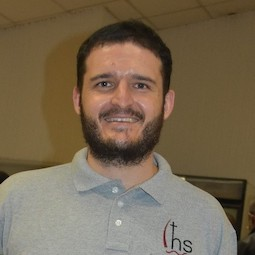I no longer wish to be authentic

Sean van Staden SJ. Image Linked In
Sean van Staden SJ, from the Jesuit Institute South Africa, writes: How many songs can you think of that contain lyrics about "being me"? James Bay asks, "Why don't you be you, and I'll be me?" Adele sings, "So I hope I learn to get over myself, stop trying to be somebody else."
Psychologists will tell you that the surest way to better mental health is to learn to accept yourself for who you are. So much anxiety and depression come from a sense of not being able to be true to yourself. Often, this comes from internalised self-shame or self-loathing.
Many spiritual writers say that the goal of the spiritual life is to move from the "false self" to the "true self." The idea is that God has created a specific true version of us, but that in our sinfulness, we sometimes live differently from this version of ourselves. Spiritual practices aim to move us towards this true self.
Be yourself! Be true! Be authentic!
I'm sorry, but I no longer wish to be authentic.
Is it possible for me to be inauthentic? Sure, I may act a certain way to be accepted by others. I may take actions that are contrary to my inner values for a variety of reasons. I may feel a sense of shame about myself or have low self-esteem.
These actions and beliefs may not be ideal; they will make me unhappy and stressed. However, I am learning to accept the difficult reality that although they may feel inauthentic, I still perform them. I may not want to admit it, but pretending, inconsistency, and shame have become part of my authenticity.
Instead of authenticity, I am now striving to become free.
St Ignatius Loyola says that the purpose of life is to praise, reverence and serve God our Lord. It doesn't matter what we do to achieve this. What matters is the why. He invites us to make ourselves indifferent about every created thing. We should be free to live a long or short life as long as we keep the end in mind.
Notice that Ignatius does not say that the purpose of life is to be "ourselves". I think he recognised that we are always ourselves, even when we may not be proud of how that self is. Instead, he invites us to live according to our deepest values and offer a life of loving service to God and others.
This is an invitation to freedom rather than authenticity. A free person is aware of their purpose in life and can make choices that resonate with this purpose. They are not held back by attachments to comfort, success, the good opinion of others, or unhelpful self-perceptions. They are not bound by fear but are liberated by faith.
I want to live my life in the freedom of the children of God, aware of my belovedness, my worth, and the belovedness and worth of all creation. I want to be able to feel the full range of my emotions. I want to love deeply and allow myself to be loved. I want to make choices that resonate with my purpose.
I will no longer say, "I wanna be me," but rather, "I wanna be free."
Follow The Jesuit Institute on Twitter @JesuitInstitute


















